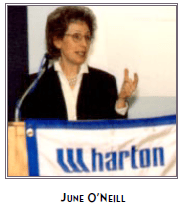Jobs, Everyone? Grads Hit the Career Track Running
Wharton’s Career Development & Placement Office reports a record year in the number of 1995 MBA graduates who have found jobs.
According to CD&P, 94.8 percent of the 769 graduates received job offers as of August 1, compared to 92.8 percent in 1994 and 84.1 percent in 1993. The average number of offers was two per graduate.
The median compensation for WG’95 graduates came in at $90,000, a figure that includes base salary and sign-on bonus.
Broken down by industry, 27.7 percent of the class accepted positions in consulting, compared to 23.5 percent in 1994, and only 9.4 percent 10 years ago. The second most popular industry was investment banking/brokerage, with 17.6 percent of the students accepting jobs there as compared to 19.8 percent in 1994.
Sixty-two percent of the students accepted offers with international responsibility—a percentage that has grown steadily over the last 10 years to set a record high this year—and 24.6 percent accepted positions overseas.
The top recruiter was McKinsey & Co., followed by Booz Allen & Hamilton, A.T. Kearney, Bain & Co., Boston Consulting Group, Merrill Lynch & Co., J.P. Morgan and Co., Andersen Strategic Services, Morgan Stanley & Co. and Coopers & Lybrand.
Eight students indicated they are entering a family business, and 11 students noted that they are starting their own company.
 Meet Reggie Reglus, founder of Reglus & Associates, a computer consulting and training company in Queens, NY. Like most entrepreneurs, he enjoys the freedom and autonomy that comes with being self-employed at the same time that he worries about making ends meet. As Reglus puts it, “Running the business is not difficult. Surviving is.”
Meet Reggie Reglus, founder of Reglus & Associates, a computer consulting and training company in Queens, NY. Like most entrepreneurs, he enjoys the freedom and autonomy that comes with being self-employed at the same time that he worries about making ends meet. As Reglus puts it, “Running the business is not difficult. Surviving is.”
Originally, Reglus focused on fast-food restaurant owners, and his major client group today remains McDonald’s franchisers, both single-store and multi-unit operators. He researches the existing software, matches it to the operator’s needs and in some cases customizes the programs to address a particular function, like cash management or accounting.
Over the past few months, he has subcontracted himself out to Comp USA and the Learning Annex, where he does training for company customers, and he recently began to research the idea of expanding into Internet consulting and systems integration.
Reglus, who works out of his home in Queens, majored in physics and economics at Bowdoin College in Maine. He became a computer expert during his five years as a budget analyst at Con Edison before coming to Wharton.
On the undergraduate side of the jobs picture, Penn’s Career Planning and Placement Service reports that 26.14 percent of its Wharton students took jobs in investment banking, 26.14 in consulting, 12.45 percent in accounting and 12.03 percent in other financial services. Undergraduates had 9,301 interviews with 365 different companies. The average number of job offers was three per student.
The overall mean salary for undergraduates was $35,437, compared to $33,900 in 1994.
 Mary K. McAllister, W’95, looked at consulting companies and investment banks before signing on as a marketing management trainee with E.& J. Gallo Winery in Modesto, Calif. She and a student from Dartmouth are the first two undergraduates hired by Gallo for its training program.
Mary K. McAllister, W’95, looked at consulting companies and investment banks before signing on as a marketing management trainee with E.& J. Gallo Winery in Modesto, Calif. She and a student from Dartmouth are the first two undergraduates hired by Gallo for its training program.
McAllister spent her first six months on different marketing projects for one particular brand—Peter Vella box wine (named after a winemaker at the company). “I’ve been involved in price sensitivity issues, consumer research, a direct mail project and package redesign,” says McAllister. “I’ve also worked on lists of names for possible new products. You contribute to the creative side of things here as well as the business side.”
This month, McAllister moves to San Francisco for a six-month training course in sales. After that she will return to the marketing department and hopes eventually to work abroad.
After a few years at Gallo, she plans to get her MBA, a move that Gallo both encourages and supports, in return for a three-year commitment to the company after graduation. “One of the reasons I chose Gallo was that it’s clear the company wants to keep the people it hires,” says McAllister. “They want a long-term relationship.”
Gruss Fellows Chosen
Three MBA students and four Executive MBA (WEMBA) students celebrated their selection as 1995 Gruss Fellows during a luncheon in November held by Wharton’s Public Policy and Management Department.
 The fellowships are funded by a $1 million gift from Martin D. Gruss, W’64, senior partner of Gruss & Co., a private investment firm in New York. The gift allows PP&M to extend fellowships to current and prospective government managers who have demonstrated their commitment to public service. It also funds new PP&M courses as well as a range of educational activities, lectures and annual forums on major public policy issues.
The fellowships are funded by a $1 million gift from Martin D. Gruss, W’64, senior partner of Gruss & Co., a private investment firm in New York. The gift allows PP&M to extend fellowships to current and prospective government managers who have demonstrated their commitment to public service. It also funds new PP&M courses as well as a range of educational activities, lectures and annual forums on major public policy issues.
The 1995 MBA fellows and their areas of interest include:
– Lara Jakubowski, a 1989 Penn graduate and former financial analyst at Lehman Brothers, interested in the management of government in economically distressed communities
– Rachna Singal, a 1992 Penn graduate and former intern at the World Bank, interested in USAID or the World Bank
– Matthew Bergheiser, a 1991 graduate of Princeton and former policy analyst at Lewin/Value Health, interested in the revitalization of depressed urban areas.
The 1995 WEMBA fellows include:
– Patrick LaCombe, country analyst for Poland and Hungary at the U.S. State Department
– Richard Nessel, chief financial officer for the New York City Department of Transportation
– Lawrence Massaro, supervisory commodity business specialist for the Defense Department’s Industrial Supply Center
– Anne Morillon, engineer/technical manager for the Department of Energy
New Ventures in Management Education
Delivery By Satellite
Interested in taking a class on “Finance and Accounting for the Non-Financial Major” without leaving your office building?
Beginning last fall, companies such as Disney, Hewlett-Packard, Texas Instruments and EDS are downlinking live, interactive executive programs via satellite from various business schools, including Wharton. In addition to the finance/accounting class, Wharton is offering “Creating Customer Value: The Essential Principles of Marketing.”
Ten courses in all are on the new Executive Education Network (EXEN) developed by Westcott Communications in Dallas, Tex.
“The network gives executives at different levels of management the opportunity to receive effective training and education on site from top business school faculty around the country,” says Robert E. Mittelstaedt, Jr., vice dean of Wharton’s Aresty Institute of Executive Education.
Executives enrolled in Wharton’s courses will be able to participate in interactive class discussions with faculty and peers via two-way audio and microphone-equipped keypads. Faculty will be able to measure a participant’s attention and comprehension, and then alter the approach or pace accordingly. Participants can receive special attention from the faculty member, just as they would in a campus classroom.
For information, call 1-800-255-3932, ext. 1577 (U.S. and Canada); or 215-898-1776, ext. 1577.
Sign of the Times
Readers of the UK edition of the Financial Times are getting a weekly course in management.
On October 27, the newspaper launched what it calls an “unprecedented joint venture” between itself and three leading international business schools — Wharton, the International Institute for Management Development in Switzerland and the London Business School. The joint venture comes in the form of a weekly supplement “introducing readers to the main concepts of modern management, exploring the latest thinking in each area and examining best practices in a range of international companies.”
The series, called “Mastering Management,” is loosely based on the core curriculum of a typical MBA course and has been written by more than 50 professors, including 15 from Wharton.
It covers 19 subjects ranging from finance, operations and marketing to ethics, leadership and organizational behavior.
The lead-off article, written by Ross A. Webber, professor of management at Wharton, was entitled “Introduction to General Management: Modern Imperatives.” Other Wharton professors contributing to the series include Michael Useem (“Building High Performance Systems”), Thomas W. Dunfee (“Social Cause Marketing”), and Peter Cappelli (“Distinctive Human Resources Are the Competitive Advantage of Firms”).
Scholarship Fund Honors a Professor And a Program
A respected professor, an admiring alumnus and a new program in international studies and business have all combined to create a scholarship fund for students interested in earning a dual degree in management and liberal arts.
James W. Zucker, W’70, a partner in the New York firm of Lawrence, O’Donnell, Marcus & Co., has pledged the initial $25,000 to set up the J.K.S. Ghandhi Scholarship in honor of Jamshed Ghandhi, associate professor of finance and director of the Program in International Studies & Business (IS&B).
Zucker, a former student of Ghandhi’s, describes him as “an inspiring and challenging teacher … who is also a classicist, opera critic and self-taught master of Dante (in the original classical Italian).”
The IS&B program offers 40 selected students a unique undergraduate course of study which integrates business and professional skills with advanced language training and a liberal arts education which includes an receive a BA in International Studies from the School of Arts and Sciences and a BS in Economics from Wharton.
Zucker’s gift has already inspired two other alumni and former students of Ghandhi — Stephen Utkus, WG’84, and Steven Markel, W’70 — to contribute to the IS&B scholarship program. Notes Utkus: “It is programs such as these that I believe truly distinguish Wharton in the area of international business and finance.”
Speaking Out
 Guest speakers from the business, government and education sectors visited campus last fall to share their opinions and experiences with Wharton students. The speakers included, among others:
Guest speakers from the business, government and education sectors visited campus last fall to share their opinions and experiences with Wharton students. The speakers included, among others:
– Paul M. F. Cheng, WG’61, chairman of the Hong Kong-based Inchcape Pacific Ltd. and N. M. Rothschild & Sons (Hong Kong) Ltd.
– Gail Dudack, chief investment strategist, UBS Securities
 – Rajat Gupta, managing director, McKinsey & Co.
– Rajat Gupta, managing director, McKinsey & Co.
– Raul Sanabria Tirado, dean of the University of Los Andes in Bogota, Colombia
– June O’Neill, director, Congressional Budget Office
– Shaun F. O’Malley, W’59, former chairman and CEO of Price Waterhouse
– Arifin M. Siregar, ambassador of Indonesia to the U.S.
Wanted: Follies Alumni to Help Celebrate 20th Anniversary
Fans of the Wharton Follies, take note: This February’s performance marks the 20th anniversary of a Wharton tradition that started back in 1977 with “A Placement Line” and has been followed up by such memorable productions as “Shall We Vance?” (1979), “Follies the Thirteenth: Nightmare on Spruce Street” (1989) and “Heaven Can Waitlist” (1995).
In honor of the 20th anniversary, Follies coordinators are trying to contact alumni from all shows, whether it was “Vancin” (1980), “Pirates of Penn Vance” (1982), “Between the Balance Sheets” (1988) or “Alice in Whartonland” (1991). Coordinators are especially interested in hearing from anyone who participated in the first few shows and who will be attending this year’s performance in Philadelphia or New York.
To celebrate 20 years of success, a reception for Follies alumni will be held prior to the New York show on February 23, 1996. Contact Lesley MacLean at (215) 545-6330 or e-mail her at maclea02@wharton.upenn.edu to be included in a database of Follies alumni or for additional information.
After all, who can forget: “Willy Wharton and the MBA Factory” (1990), “CLUEless, or Death of a Curriculum” (1993), and “As Wharton Turns – the Young and the Jobless” (1994)?
Or “Ain’t Calculatin’” (1981), “ET – The Economy’s Terrible” (1983), “Retained Yearnings” (1985), “Publish and Perish” (1987) and “Yield to Maturity” (1986)?
Or “Harry, Is This Wharton?” (1978), “Big Deal: A Dramatic Offering” (1984), and “The Wharton Television Network” (1992)?
Campus News
– Reflecting a growing interest among undergraduates in emerging and transition markets, Wharton has established The Undergraduate Emerging Economies Fellows Program to study such areas of the world as Eastern and Central Europe, Latin America, India, China and Southeast Asia. Students who choose to focus their studies in this area must complete a summer internship in an emerging economy and demonstrate proficiency in the language of their target region.
The academic theory component of the program — which offers a “focus” rather than a distinct major or minor — is drawn from the existing undergraduate curriculum, including electives that deepen students’ knowledge of the target area. Students are also required to take a course entitled “International Industrial Development Strategies.”
This initiative, which hopes to attract approximately 15 sophomores each year, is modeled closely on the MBA Emerging Economies program established last year.
– To help boost the ranks of highly trained African-American and Hispanic-American business leaders, a consortium of five business schools, nine major corporations and seven predominantly minority colleges and universities have created a nonprofit organization called the Management Education Alliance.
The goal is to create centers of excellence in business education at African-American and Hispanic-American colleges and universities in ways that will help these institutions develop a particular competence in some aspect of management education. The centers will also better prepare their graduates for the rigors of a competitive global marketplace.
The alliance has already initiated a number of projects, including corporate internships and executive education seminars targeted to faculty members at minority colleges who typically don’t have access to executives in their field or may lack the practical experience needed to further their own understanding of business.
Among the participating business schools are Wharton, the Harvard Business School, the Darden School and Emory University. Kenneth Shropshire, associate professor of legal studies and real estate, is Wharton’s liaison to the consortium.
– Shiv K. Gupta, a professor of Operations Research and Marketing at Wharton from 1966 to 1992 and chair of the School’s operations research program from 1971 to 1984, died in June in Delhi, India.
Over his long career, Gupta published more than three dozen professional articles on topics such as ballistics, estimation theory, marketing, logistics, system theory and casino operations. He also authored three books, the last one entitled “Fundamentals of Operations Research for Management”.
In Gupta’s memory, a loan fund to help Indian graduate students attend Wharton has been established through Wharton’s development office.


























